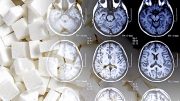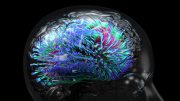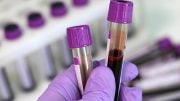According to new research, clues to the development and possible treatment of Alzheimer’s disease may come from an ancient human foraging instinct, fueled by fructose production in the brain.
Researchers say an evolutionary foraging instinct that relied on the sugar fructose, may now be fueling the formation of Alzheimer’s disease.
An ancient human foraging instinct, fueled by fructose production in the brain, may hold clues to the development and possible treatment of Alzheimer’s disease (AD). This is according to scientists at the University of Colorado Anschutz Medical Campus.
Published recently in The American Journal of Clinical Nutrition, the study offers a new way of looking at a fatal disease characterized by abnormal accumulations of proteins in the brain that slowly erode memory and cognition.
“We make the case that Alzheimer’s disease is driven by diet,” said the study’s lead author Richard Johnson, MD, professor at the University of Colorado School of Medicine specializing in renal disease and hypertension. The study co-authors include Maria Nagel, MD, research professor of neurology at the CU School of Medicine.
Johnson and his team suggest that AD is a harmful adaptation of an evolutionary survival pathway used in animals and our distant ancestors during times of scarcity.
“A basic tenet of life is to assure enough food, water, and oxygen for survival,” the study said. “Much attention has focused on the acute survival responses to hypoxia and starvation. However, nature has developed a clever way to protect animals before the crisis actually occurs.”
“A study found that if you keep laboratory rats on fructose long enough they get tau and amyloid beta proteins in the brain, the same proteins seen in Alzheimer’s disease.”
— Richard Johnson, MD, professor at the University of Colorado School of Medicine
When threatened with the possibility of starvation, early humans developed a survival response that sent them foraging for food. Yet foraging is only effective if metabolism is inhibited in various parts of the brain. Foraging requires focus, rapid assessment, impulsivity, exploratory behavior, and risk-taking. It is enhanced by blocking whatever gets in the way, like recent memories and attention to time. Fructose, a kind of sugar, helps damp down these centers, allowing more focus on food gathering.
In fact, the researchers found the entire foraging response was set in motion by the metabolism of fructose whether it was eaten or produced in the body. Metabolizing fructose and its byproduct, intracellular uric acid, was critical to the survival of both humans and animals.
The researchers noted that fructose reduces blood flow to the brain’s cerebral cortex involved in self-control, as well as the hippocampus and thalamus. Meanwhile, blood flow increased around the visual cortex associated with food reward. All of this stimulated the foraging response.
“We believe that initially the fructose-dependent reduction in cerebral metabolism in these regions was reversible and meant to be beneficial,” Johnson said. “But chronic and persistent reduction in cerebral metabolism driven by recurrent fructose metabolism leads to progressive brain atrophy and neuron loss with all of the features of AD.”
Johnson suspects the survival response, what he calls the `survival switch,’ that helped ancient humans get through periods of scarcity, is now stuck in the `on’ position in a time of relative abundance. This leads to the overeating of high-fat, sugary and salty food prompting excess fructose production.
Fructose produced in the brain can lead to inflammation and ultimately Alzheimer’s disease, the study said. Animals given fructose show memory lapses, a loss in the ability to navigate a maze, and inflammation of the neurons.
“A study found that if you keep laboratory rats on fructose long enough they get tau and amyloid beta proteins in the brain, the same proteins seen in Alzheimer’s disease,” Johnson said. “You can find high fructose levels in the brains of people with Alzheimer’s as well.”
Johnson suspects that the tendency of some AD patients to wander off might be a vestige of the ancient foraging response.
The study said more research is needed on the role of fructose and uric acid metabolism in AD.
“We suggest that both dietary and pharmacologic trials to reduce fructose exposure or block fructose metabolism should be performed to determine if there is potential benefit in the prevention, management or treatment of this disease,” Johnson said.
Reference: “Could Alzheimer’s disease be a maladaptation of an evolutionary survival pathway mediated by intracerebral fructose and uric acid metabolism?” by Richard J. Johnson, Dean R. Tolan, Dale Bredesen, Maria Nagel, Laura G. Sánchez-Lozada, Mehdi Fini, Scott Burtis, Miguel A. Lanaspa and David Perlmutter, 11 January 2023, American Journal of Clinical Nutrition.
DOI: 10.1016/j.ajcnut.2023.01.002
The study’s co-authors include Dean R. Tolan, Dale Bredesen, Laura G. Sanchez-Lozada, Mehdi Fini, Scott Burtis, Miguel A. Lanaspa and David Pearlmutter.









Well that surely makes sense to me. I have a great sweet tooth, so now I deliberately stay away from sweet things, trying to keep my natural tendency to indulge out of range by simply having none of it in the house ! I have found since I’ve been doing that my interest has definitely gone down – ie the more you teach your appetite to ONLY be interested in good foods, it gradually gives up & stops pushing for the sweet things. I went thru the Christmas period indulging (hard not to when delicious things are sent to you as gifts) & now 2 months almost later I am just about back to my pre-Christmas level of ‘hunger’ – IOW can more easily just turn away from the temptations. So now I’m trying to not eat after my main meal at 4.0 pm, and try to picture delicious savory things if the cravings for sweets start ! Damn you stomach you are not winning ! The added weight since Christmas is falling off again – yeah ! This article makes total sense to me & fructose is one of those substances that are added to so many pre-made foodstuffs !
Fructose is fruit sugar. Are these researchers suggesting that fresh fruit is the culprit? Or, should they be CLARIFYING that the high levels of corn fructose added to almost all foods, is the real problem from the dietary standpoint!
Frankly I dont believe that eating fruit and its fructose causes disease.
I am from Europe (Poland) and in 90’s I would say similar like you, but fruits available in markets today (I don’t know how in your country) are very sweet compared to these from 90’s before the “modern” agriculture methods flooded our food industry. Now, there’s almost impossible to buy an apple which isn’t very sweet, even hard green varieties. The same situation is with pears and pineapples. I know that there are other bitter and sour fruits but this situation clearly shows that selling sweet is more profitable than thinking about consequences in future. Even food considered as “healthy” is gradually modified in a wrong way.